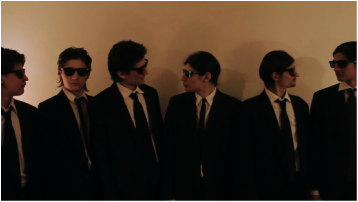Review:
"The Wolfpack"

Release Date: June 19, 2015
Rating: R Running Time: 89 minutes Many of us were raised on film. But how many of us were socialized by film? Precious few, I hope, judging by Crystal Moselle’s distressing documentary The Wolfpack. Moselle’s subjects are the seven Angulo siblings, who claim that their parents essentially kept them locked inside their Lower East Side of Manhattan apartment for most of their childhood. Why? Their Peruvian-born father Oscar feared the mean streets of New York, so he refused to let his children—six boys and one girl—leave their apartment except for medical appointments etc. Homeschooled by their mother, Susan, the Angulo kids learned in part about the outside world through the films they watched. It wasn’t until one of the boys, then 15, was curious and brave enough to sneak out of the apartment that some of the kids felt the need to assimilate into society. Moselle takes us inside the apartment, where the older Angulo brothers spend their days reenacting scenes from ReservoirDogs, Pulp Fiction, and Christopher Nolan’s Dark Knight films. On the rare occasions when the brothers venture outside, they’re usually dressed in Quentin Tarantino gangster garb. The Angulo apartment is a gloomy prison of sorts, with Oscar spending most of his time out of Moselle’s sight as she films the brothers at play. At least one brother refuses to talk to Oscar, which does not come as a surprise. If Oscar’s explanation is to be taken at face value—and some of the Angulo brothers offer evidence to the contrary—he’s failed his children. A parent is supposed to prepare his children for both the real and the perceived danger to be found in the world. By locking up his children, Oscar’s probably caused more emotional and psychological harm to his children than the schoolyard bullies and petty crooks found in New York ever could. Remarkably, the Angulo brothers profiled in The Wolfpack seem somewhat well adjusted given the circumstances. A few harbor bitterness toward their father but they don’t allow their anger to dictate their behavior. Oscar is painted as a drunken villain in The Wolfpack; their mother, Susan, is portrayed as much as a victim as her children. During the course of The Wolfpack, she finds the inner strength to defy Oscar to the point where she calls her mother for the first time in decades. It’s a huge victory that suggests the end of Oscar’s time as his family’s jailer is coming to an end. How much of the inner strength Susan eventually comes to display is a result of Moselle’s presence in the apartment is open to debate. While it’s good to see the Angulo brothers break free from their father, there’s still something about The Wolfpack that seems off. It mostly has to do with Moselle keeping the documentary firmly focused on the Angulos. There aren’t any strong outside voices to corroborate the Angulos’ story or to provide insight into their years of confinement. No doubt Moselle wanted to duplicate the sense of isolation that the Angulo siblings felt. Or perhaps she did not want any outside influences to possibly debunk this dysfunctional family tale as an urban myth. There’s no denying The Wolfpack is stranger than fiction. However, it remains to be seen whether each of the Angulo siblings will enjoy his or her own happy ending. Robert Sims Aired: June 18, 2015 Web site: http://www.magpictures.com/thewolfpack/ |
|
